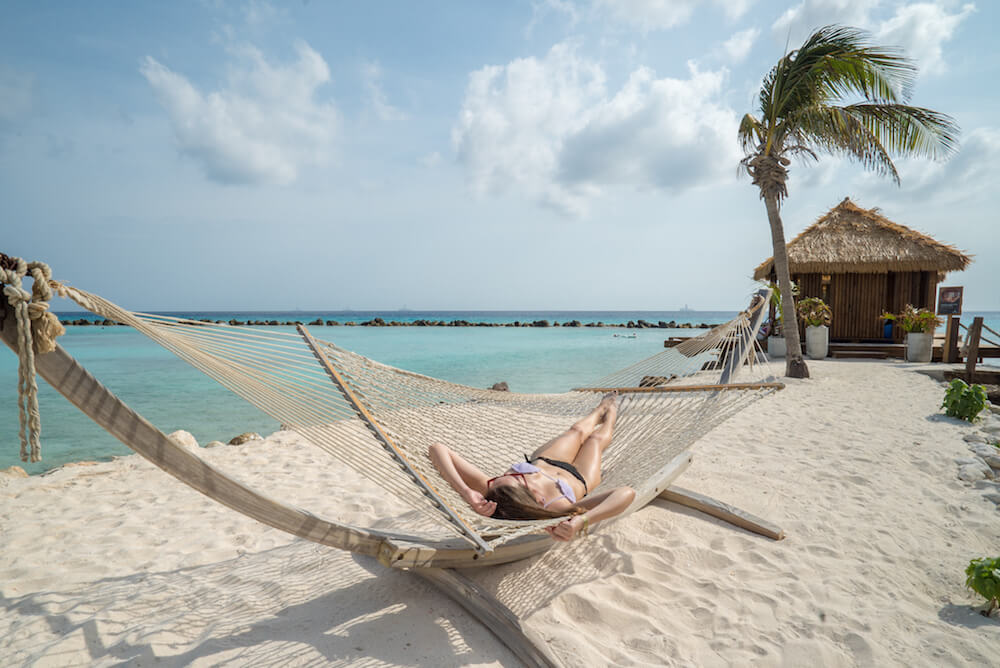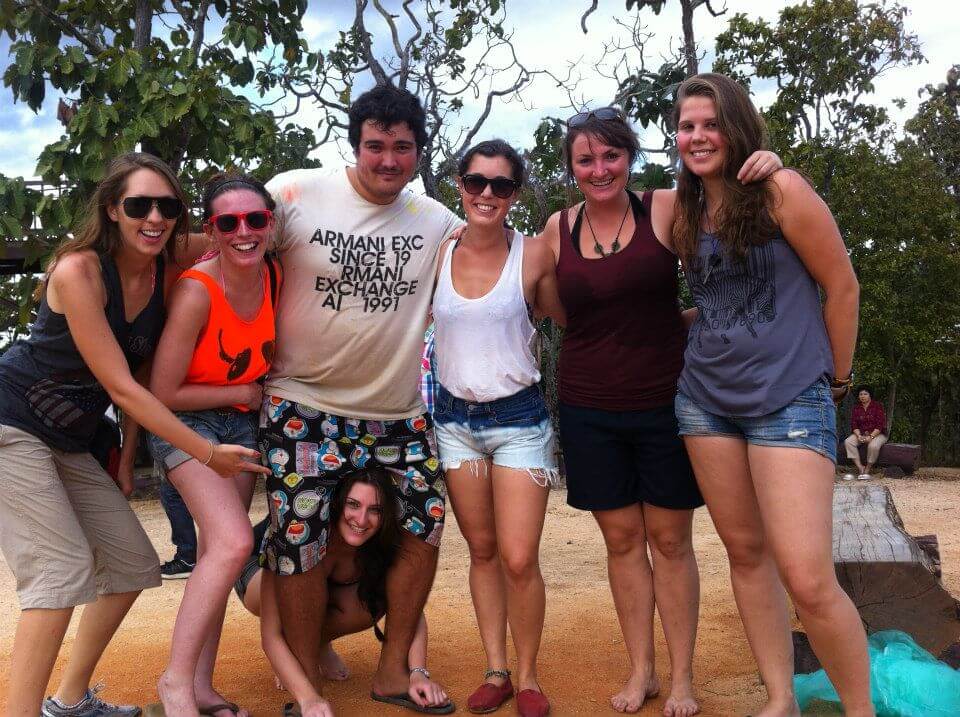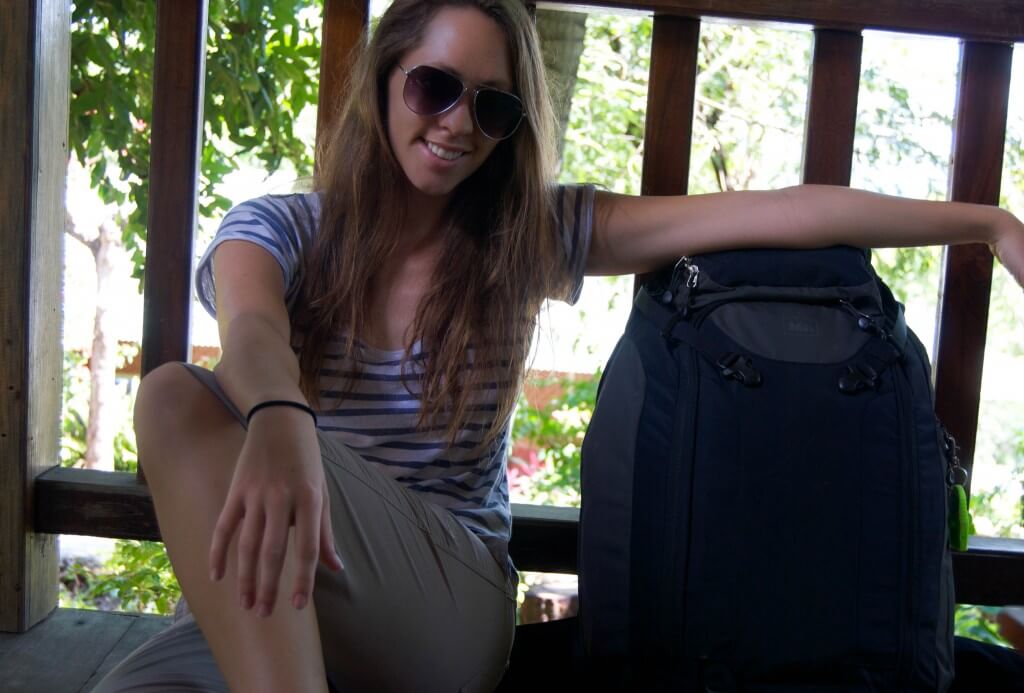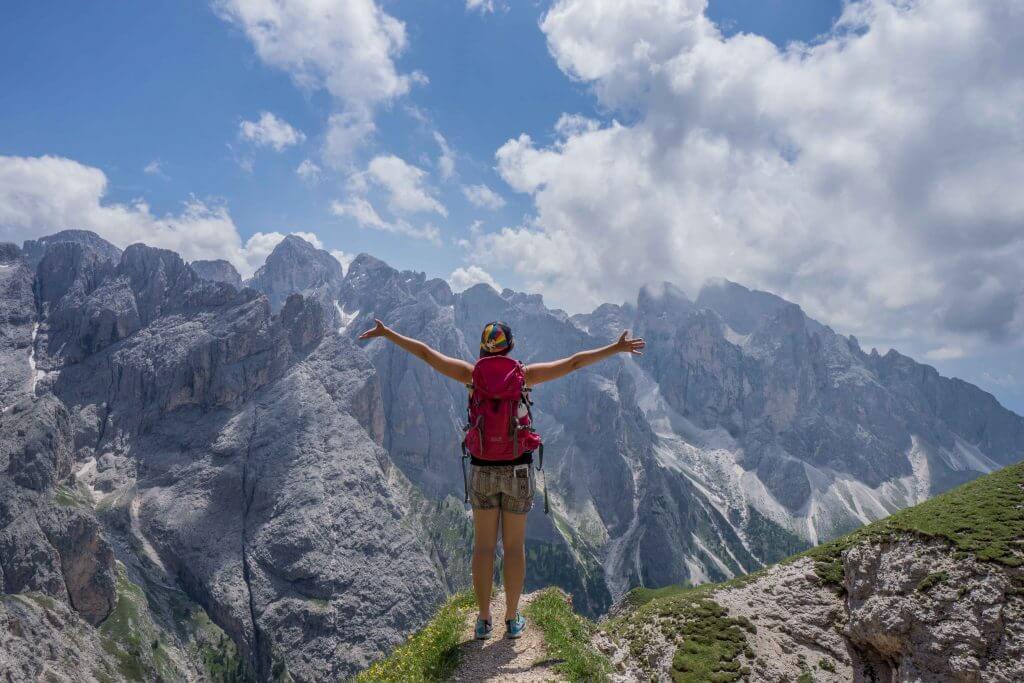In a recent email, BMTM reader Isabella asked me,
Do you think long term travel/backpacking is inherently selfish?
One obvious reason is for people who are leaving friends and family and missing out on quality time with them.
But I think a bigger reason is because backpackers are basically hedonists – they go out to seek pleasure, to do whatever it is they want to do, for the cheapest price. They usually won’t contribute a lot to the economy because they’re on a tight budget. Maybe they will interact with locals positively, but aren’t they receiving a lot more knowledge/hospitality than they are giving back? How are they contributing to society?”
If the answer is yes, it is selfish, I guess a follow up question would be – what’s wrong with being selfish? 😛 It probably depends on the person!”
It was such a good question that it had me thinking of all kinds of arguments and angles because while I believe that yes, it is selfish, I think there’s so much more to it than that. If done right, traveling is actually an incredibly generous act. Let’s deep-dive:
Are we travelers hedonists?

A hedonist is, by definition, a pleasure-seeker.
I think it’s part of the human experience to be hedonistic now and then. I believe that life is supposed to be fun, like a dance, a concept I learned from Philosopher, Alan Watts.
Part of the joy of traveling is following your bliss. I think playing and relaxing is important and that we are taught to repress it too much in the name of productivity and purchasing power.
Taking a break is important. Doing something for yourself is important. We can be better sisters, brothers, mothers, children, friends, and partners when we take all-important time for ourselves.
However there is a delicate line we tread between being a traveler who contributes meaningfully and a raucous backpacker who disrespects locals and their environment. If someone is only traveling for a cheap party, then it seems to me there isn’t much point in leaving home.
It’s a choice – will you be a good guest or a bad tourist?
Are thrifty backpackers failing to contribute at a high enough level?

Does being on a tight budget mean contributing less to the local economy? Not necessarily.
On the surface it might seem like a cheap backpacker isn’t helping the local economy much by trying to save every dollar and haggling like a pro, but in a lot of ways he/she still does.
I was super thrifty during the first couple years of my travels/this blog. I was hunting for a good deal, often spending only $2-5 per night on accommodation, but that also meant that I was more likely to be spending it locally. Most of the basic backpacker accommodation I stayed in during my two years in Southeast Asia was locally-owned, putting money directly into the pockets of small business owners, not Hilton’s.
The same goes for food. Street food goes directly to the smallest business owners, who also shop locally at the markets, buying directly from farmers, and so on. I see a lot of good in that – it’s fresh, it’s local, it’s good for the people and good for the planet.
I’ve also found that I can often go cheaper by talking directly to the source, like a private hike through the jungle searching for Orangutans for 25€ in Indonesia, or a boat trip in Mozambique because we talked directly to the person who owned the boat, or buying jewelry directly from the woman who made it on the street in China rather than in a shop.
When you start getting smart on how to save money, it often brings you closer to the small business owners and when spent right, a little money is way better than no money, or money that only gets remitted back to big businesses overseas.
Are we receiving more than we give?

This one is hard to answer because it’s so subjective. Maybe the guesthouse owner in Mozambique is happy to have my $15 for her bungalow, which allows her to employ more local people, though maybe she’d prefer that the beach never saw tourists and remained the same as it was before we arrived.
Each situation will be different. In some cases, tourism bolsters the economy and keeps the place alive, like in Churchill, and in some it ruins the tranquil vibe that locals once enjoyed.
All we can do as travelers is approach everything with respect. Respect the people, their environment, their way of life, and their need to earn a living as much as we can without being taken advantage of.
How does long-term travel contribute positively to society?

Learning about the world helps you become a better citizen of it, I believe. It’s the best education you can find, because you learn a little something from everyone if you remain open and curious. It’s also a reminder of just how lucky those of us who travel are.
I believe these perspectives lead us closer to ourselves and our desires. It makes us see how small we are in the world and how interconnected too. People generally have a better idea of who they are and what they want after traveling long-term. It’s often a catalyst for growth.
For me, traveling led me to my dream. I became a writer, a published author, a photographer, and learned how to build my own business using the world as my classroom and in many cases, a cheap way of paying rent while I was building.
If more of the people who voted in powerful countries were out living to their true potential, having more fun, and truly appreciating their privilege, I think we’d have more understanding and appreciation for each other. That would not only make time spent with one’s family more enriched and meaningful, but it would help everyone on a grander scale if we were happier as a whole.
As author Marianne Williamson so brilliantly said, “As we let our light shine, we unconsciously give other people permission to do the same. As we are liberated from our own fear, our presence actually liberates others.”
It took me years after reading that to fully, deeply understand it, and I couldn’t have without traveling.
So no, I don’t think that backpacking is inherently selfish. On the surface it certainly can be, but it’s also one of the most powerful tools of growth and change available to us.
What do you think?
Ijana Loss says
Yes that’s exactly my opinion, especially that little point about privilege towards the end. Those of us who have the resources to travel I feel would be doing a disservice to those who don’t if we didn’t use that privilege. Because if I was from an undeveloped country and would probably never be able to travel in my life, I would wish so hard that everyone who had the possibility to would jump on it, to be able to experience those things I never could. And in reverse, if I couldn’t travel, then the only hope I would ever have of getting to know the world was if those privileged travelers came to me.
Another point is that a lot of people consider a lot of things selfish. They’re of the mind that other people should come first, or something I hear a lot from religious folk is that God comes first, then others, then yourself. Well I think it’s actually the other way around. Only if you’re truly living your own life fully and happily will you be able to contribute the absolute most to society (and to God, if that’s your belief). And so in that regard, travel is one of the least selfish things you can do because if you do it right, you better yourself and others. But yes of course there will always be the bad apples who do just travel for a cheap party, as you said…
Kristin says
Nice to hear from you Ijana! How’s Germany life treating you?
I recently heard, “you have to put on your own oxygen mask before helping others,” in regards to personal growth and helping others, and it’s so true. Something might seem selfish to the outside world but if it’s what you need to do so that you can be whole and eventually be more open to helping others then it’s exactly what you need to do, including traveling. Thanks for sharing your perspective.
GG says
Hi Ijana, hope you don’t mind adding comments here, but like this thread and enjoyed your comments :). I think traveling is a great thing and for so many it is so beneficial for their growth. Side benefits include helping others around them and sometimes society as a whole. However, most I imagine do not do it primarily for charitable purposes, they just do it because it was they enjoy and make it a lifestyle, career, opportunity to become whole (stealing from Kristin). I strongly feel the backpacking/nomadic lifestyle should not be picked out as “selfish”, every lifestyle or job has its share of “selfishness” and “selflessness” (even charities, some of which are very wealthy). By the way, so many travelers feel this guilt, selfish people don’t worry if they are selfish. Plus some of the most engaging and helpful people in my adventures were fellow adventurers (e.g., my eclipse experience). It is awesome if traveling brings out the best in you. The religious angle is really interesting, thanks for bringing that up. Some will guilt people into caring about their own needs. Some are self-serving and self-righteous. However, I have been fortunate to meet some religious people who encourage people to explore the world and nature as a way to be closer with God and His creation, seeing Him in every waterfall, rainbow, sunset, a starry Tanzanian night, flowerbed, butterfly, or beluga whale in Hudson Bay. So, while traveling you are simultaneously honoring yourself, sharing with others, and being close to God. No favorites! Anyhow, whether you are religious or not, all those things described above make me appreciate the beauty of nature and how lucky we are to live on such a beautiful planet and need to take good care of it. The world needs travelers like it needs other “careers” or people.
GG says
Hedonism is a strong word and implies only physical pleasure. I find that serious backpackers and nomadic travelers are seeking much more than that as can be attested to the incredible journey of growth, success and healing that Kristin and other travel bloggers have experienced. One sure wants to engage in pleasure, but pleasure takes on many dimensions, and in my opinion, the answer to “are backpackers hedonists?” is with few exceptions, no. Sure, you have as in anything in life those who act almost like parasites, living off of others, leaving damage in their wake (ask some hotels!), but you find that in every walk of life and profession.
The issue of being selfish or not is more complicated. I think that people need to be selfish from time to time in order to be more effective at being selfless the rest of the time (and yes, sometimes you can be selfish and selfless at the same time, but this is different). You don’t want a situation where giving of yourself to others takes too much away from you. I think selflessness needs to be accomplished from a position of strength, don’t let giving to others demean your own self worth. I know this from personal experience, especially from women who give and give and think that is the only thing they can do.
As for backpackers/nomads/lone travelers being selfish, as a parent if my child did this activity safely, could live a healthy life doing it, I would be happy for him/her. It is not for me to judge what one does for a living. One could argue the same about any career (too many lawyers? a graffiti artist? my son with a PhD. is a shoe salesman!….). Funny thing is this lifestyle tends to be one of sustainability, with low consumption of goods and services. Sure, maybe for some it involves not giving back much, but it doesn’t take much either. It is about scale and revenue and debits. Nonetheless, I found that people like Kristin and BMTM and others who have travel blogs, write books, etc. are contributing a lot to society by sharing their personal journeys and providing great travel advice to others, including ways to be safe. At the same time they have a productive career, as good as any other, even better because their “work” is not “work” at all to them. And like other careers, lots of people in this walk of life do it for a time and then perhaps move on and have families, or in many cases have families who join them like two of my friend families (it is not fair to assume that everyone goes it alone forever and does not have anyone join in the ride). Lastly, like Ijana said, most travelers come out of the experience more worldly, more appreciative of what they have, more tolerant, more mature. I know of one country that strongly encourages a one year break to travel the world for this purpose. One thing to add to Ijana: I would hope that those in developing countries at least through their children have a chance to explore the world too as we in the world learn to share our wealth better.
Mental health, at least in the U.S., is still understated, when it should be treated at the same level as any other health concern and affects so many people. Living a life that gives you peace and satisfaction should be emphasized more. Lots of career successes are measured by money and prestige. These things are ephemeral. At the end of your life you think of other things than than, especially those journeys of growth and learning, which many grandparents share with their children who only as adults appreciate such gift of wisdom.
So, as for traveler/backpackers/solo nomads being selfish, I would say no more than any other lifestyle, it is just different, not conforming to what society defines as a normal lifestyle. There are opportunities to give back big time and others who do it just for themselves. For so many, I think the person who comes out of the experience is a better man and woman for it than the person who came into it which means a better father, mother, brother, sister, and friend.
Kristin says
I totally agree that living a life that is on your terms is the path to contributing better to society, provided that ‘your terms’ are not damaging. However, whole people don’t seek to destroy or hurt others, or themselves, and traveling helped me to become a more whole person. I wish the same for anyone else who wants to try it!
GG says
Thanks for adding that great point!
GG says
Sorry for being so wordy and commenting on comments but never knew about Alan Watts and just read some of his stuff thanks to your link and wanted to share some thoughts on it. First, thanks for sharing, sweet stuff. It is true a lot of what he says. So many people I know count down to 5PM, or the weekend or to the next vacation and I ask “how about all those days/hours in between!!???”. Life is so temporary and time goes by so much quicker than people realize (I can’t help but feel a strange urgency as I get older)! Got to enjoy every moment. It is like a dance or musical composition but you don’t know when the music will end so enjoy it while you can. I think life is also a journey to the extent that a journey is about growth and I hope people grow as they live their life. It is just that your whole life is not one journey, but a culmination of many journeys and experiences, much like travel (by the way this is my argument for enjoying life today even if you believe in the afterlife or reincarnation, just another mini-journey). We do need to teach in our schools and in our society that reaching a goal is not a means in itself, you need to enjoy the whole experience along the way. Plus one should not be too narrowly focused as you head toward your goal, don’t beeline for it and not look right or left, consider wandering off on different paths to your destination and seeing where it takes you. You’ll get to your goal, don’t rush! I have this tendency big time. It is challenging, reaching that goal and getting that reward as soon as possible is a big pull!
This isn’t utopia, we have to work hard to be good at what we do, whether travelers, doctors, engineers, scientists, writers, even insurance. People worked hard to develop the technological marvels we have today that are now used to explore more safely the most remote areas of the world as well as the way to create wealth to make basic needs a second thought in many places in the world. However, some of the greatest inventions, breakthroughs occur when not “in the office”, taking time to “dance” and happier people make for happier families and more productivity, not the other way around. Another important thing that I just learned is how important it is emphasize the joy of the moment. It comes in so handy when life hands you a curve ball. It is how I can finally understand how friends dealing with hurricanes in FL and TX are able to relay to me how despite everything, they can find some happiness and joy in how everyone has come together as a community and even had time to stop and be a family. Even how one can recover from a loss of a loved one. Sometimes the dance of life is a group effort (or with a partner); happiness might need to be a team effort (sometimes solo too as shown in this blog!), especially with someone who has to deal with mental or emotional illnesses or syndromes.
Promise this is my last comment on this thread! Thanks.
Shelby Morrison says
So many points I agree with here! Pleasure is good, and to demonize it is to go in the wrong direction. To me, calling a traveler selfish is just like calling a childfree person selfish. I think people are threatened by different lifestyles sometimes. In the end, can’t you call everything selfish if you try hard enough? But unlike with kids, I can sort of see how a long-term traveler could be selfish. You put it so perfectly. Be a good guest, not a bad tourist. Respect truly is key! Plus, if a person wants to travel and feels like that, there are PLENTY of opportunities to give back to a community through volunteer work. But just like you said, tourism is a great industry we should support. And that $5 money is MUCH better spent buying local goods, than $500 going into corporate (America usually) pockets. I believe we actually do more good with our money in small towns across the world as it goes right back into local’s pockets. I’ll take your brilliant quote with me: Learning about the world helps you become a better citizen of it. Wise words and a great post!
Kristin says
Thanks so much Shelby! Yes I firmly believe that even though backpackers are spending less, they’re often putting it directly in the hands of locals and that’ll beat out big spenders who are, in essence, just sending remittances back home if/when they stay in foreign-owned hotels. Sometimes that’s me, by the way. Sometimes I do stay in nice hotels. It’s all about balance.
I’ve been on the fence about volunteering since I’ve started traveling. It’s a complicated subject because I’m not sure that I’m actually helping with my limited building, teaching, and cultural knowledge of the place. However money helps, and I am a big tipper. Sometimes I tip way, way over the suggested amount and that’s how I give back. I like to reward the people who are working the hardest.
Dana Kirsh says
There’s also the question of the effect travelling physically have on the environment. Flights are a big contributor to climate change. Each one of us has a limited “carbon budget”, and frequent travellers exceed theirs. Many people can completely avoid flying and minimise their carbon footprint, yet because we all live on the same planet, they will still be affected by climate change caused by those frequent fliers who travel regularly, which can be seen as selfish.
Kristin says
True but, most of the issues with our environment come from dirty ways of producing energy, when the possibilities already exist for it to be clean. It’s not about the individuals traveling, it’s about the corporations that are heavy polluters, the policies that need to change, and the general public refusing to shoulder the blame but rather demanding clean energy.